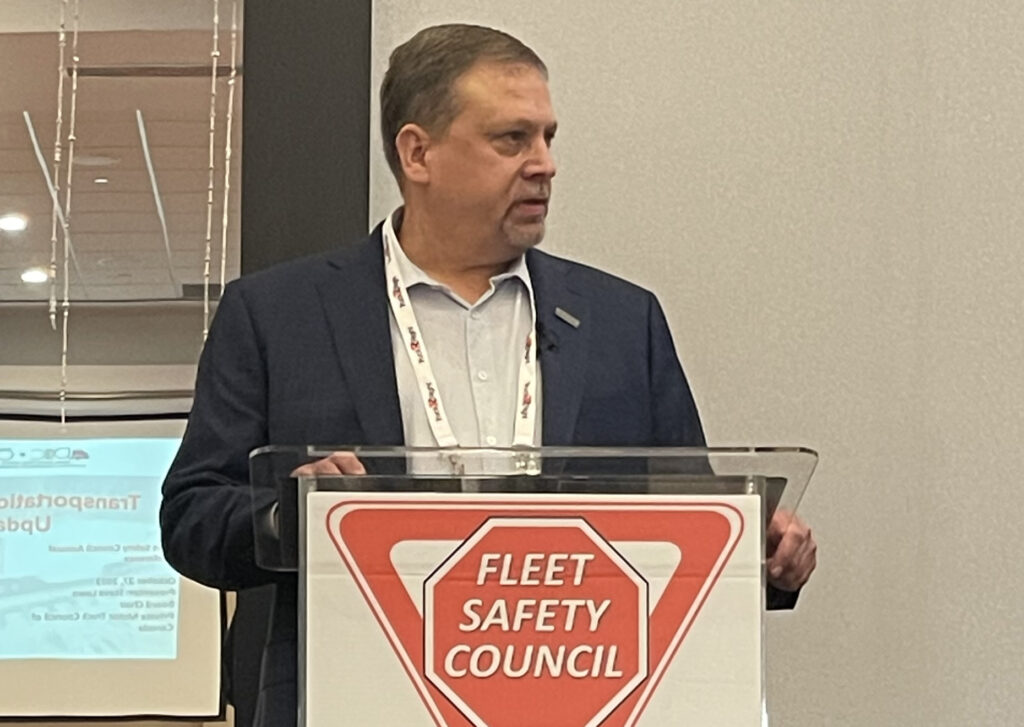ELD technical standards under review, other challenges remain: PMTC chairman
Transport Canada is in the midst of reviewing technical standards for electronic logging devices (ELDs) just as the number of certification bodies is about to shrink.
Ninety-eight devices from 45 manufacturers have been certified as meeting underlying technical standards, Private Motor Truck Council of Canada (PMTC) chairman Steve Lawn said during a regulatory update for the Fleet Safety Council (FSC). But CSA Group recently announced that it will be withdrawing from the list of certification bodies, leaving FPInnovations and Commercial Driver Technology to do such work moving forward.
He expects delays in recertification processes as a result.

Transport Canada will consult with the trucking industry once draft regulatory changes are complete. While there is no official deadline set, PMTC expects changes to be announced in the fall, Lawn added.
Challenges in transferring ELD data to law enforcement officers on the side of the road appear to be “smoothing out”, he said, referring to previous delays with the public key technology (PKI) system, and enforcement officers who lacked encryption codes.
But while the enforcement of the ELD mandates for federally regulated carriers began Jan.1, there are still issues with uneven enforcement from one jurisdiction to another, Lawn said.
All provinces are enforcing ELDs for federally regulated carriers, but not all provinces have the same requirement. While Newfoundland and Labrador will begin provincial enforcement on Dec. 1, and Nova Scotia on Jan. 1, 2024, Alberta and Saskatchewan have no plans to enforce ELDs on provincially regulated carriers, he said.
“Points may not show up on the carrier safety rating profiles, if not from that jurisdiction,” he added, referring to a challenge that fleets can face even if violations are recorded in another province. “For this to occur equally, the Conviction Equivalency Table must be updated to include ELD violations.”
Ferry exemptions remain an issue as well, Lawn said, noting how drivers may run out of hours while waiting in line for a ferry or during boarding processes. “It still hasn’t been addressed and may be addressed when they [Transport Canada] do the technical standard update.”
Other trucking regulatory updates
Lawn’s regulatory update also noted:
• Ontario removed the in-person air brake knowledge test for license renewals on Sept. 1. It is replaced with an online learning module that takes roughly 30 minutes to complete. The driver must take proof of completion to their driving test.
• The Ontario Ministry of Transportation (MTO) and stakeholders are working to replace current procedures to obtain a Commercial Vehicle Operator’s Registration (CVOR) with 16 learning modules, which will take seven to 12 hours to complete. Lawn said implementation dates are not yet confirmed, but the target date is early 2024.
• Ontario is shifting to an amended permit to allow 60-foot trailers, which have been operating under a pilot project. While participating carriers have been limited to eight permits, proposed changes would allow an unlimited number of permits after five years of operation if safety conditions are met.
An industry-wide limit of 40 permits, as well as the requirement for a shipper and a carrier to be linked, might be removed, Lawn said, adding that those changes are expected to be implemented in November or December.
• All Ontario tow truck drivers must be certified to drive a tow truck by July 1, 2024. MTO is implementing that requirement in several stages.
• Federal funding to train and recruit new truck drivers is still available, but the final deadline to apply for the funds is approaching.
“If you’re looking to get some funding, you need to apply by the end of November,” Lawn said. “The funds have to be used by the end of March 2024. To date, 90% of that $46 million has already been utilized.”
Participating employers must apply through Trucking HR Canada’s Career Expressway program and be pre-approved. In addition to funding for non-driving positions, $10,000 is available for entry-level training and an additional $10,000 for onboarding.
• Additional funding was provided to Trucking HR Canada to update the National Occupational Standard for commercial vehicle operators. Updates are expected by this fall.
Have your say
This is a moderated forum. Comments will no longer be published unless they are accompanied by a first and last name and a verifiable email address. (Today's Trucking will not publish or share the email address.) Profane language and content deemed to be libelous, racist, or threatening in nature will not be published under any circumstances.